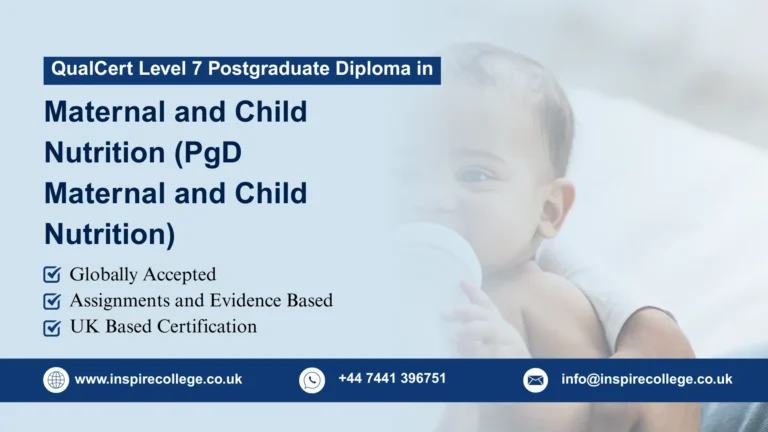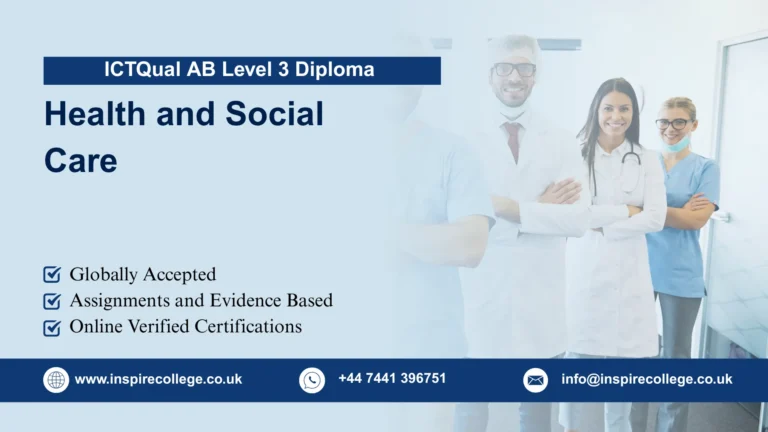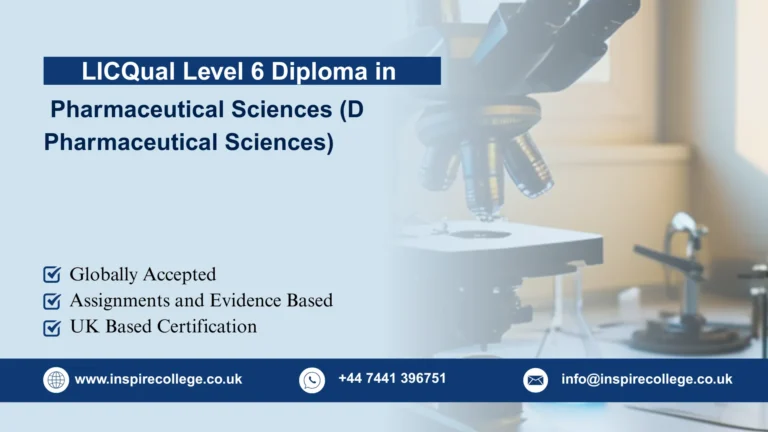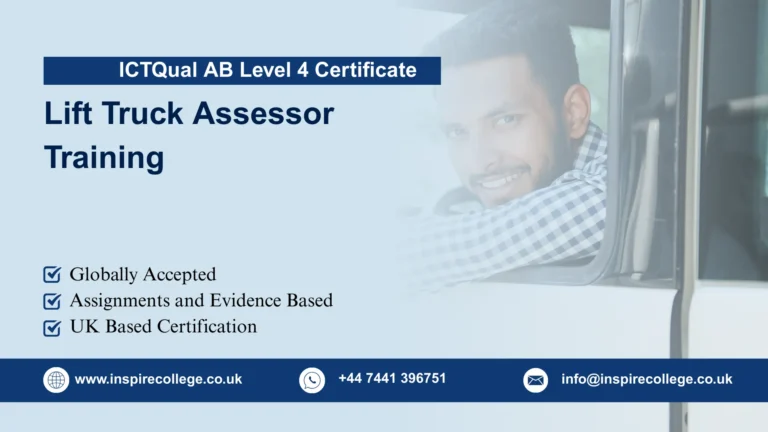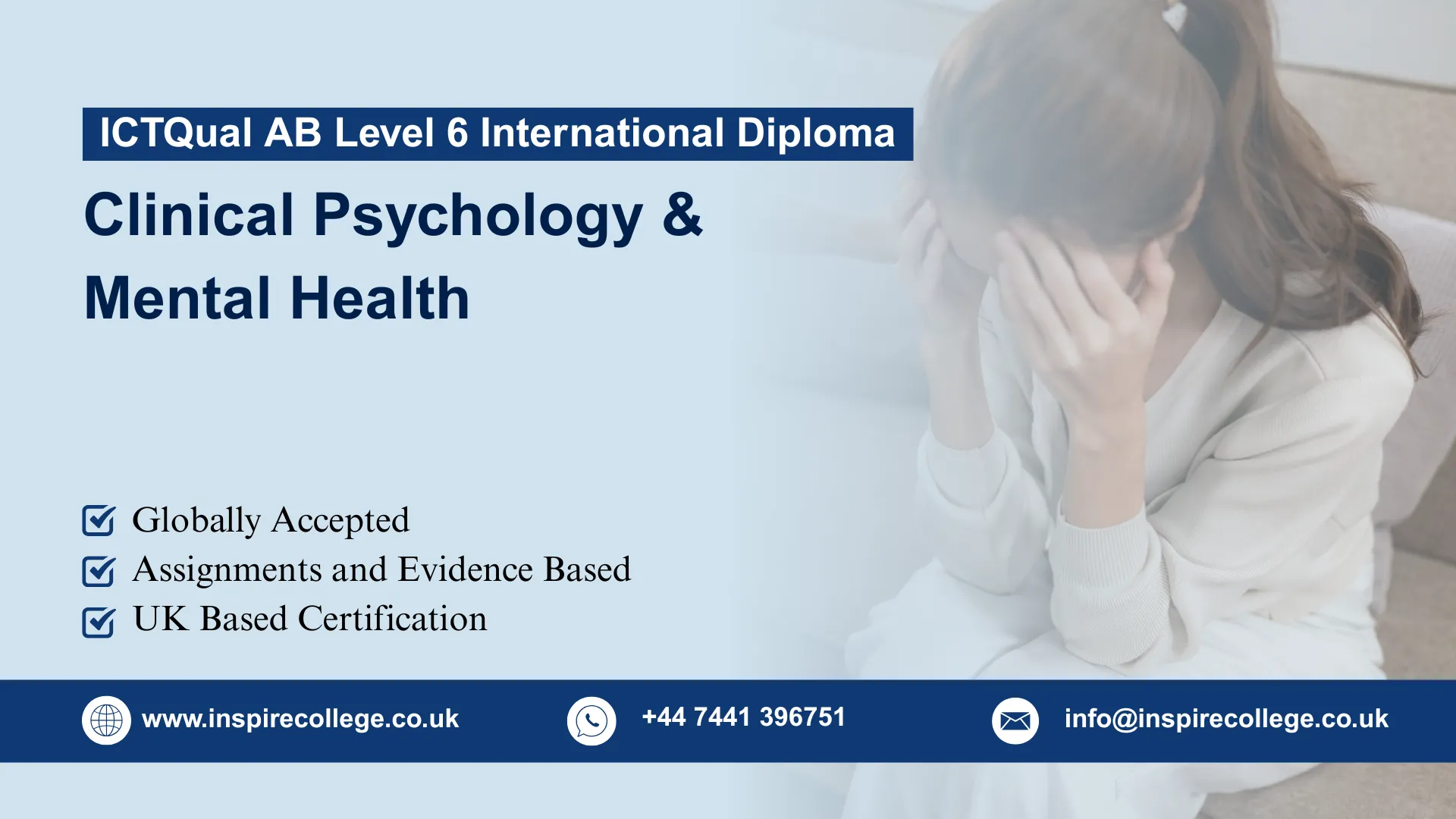
ICTQual AB Level 6 International Diploma in Clinical Psychology & Mental Health
The ICTQual AB Level 6 International Diploma in Clinical Psychology & Mental Health is a globally recognised qualification designed to equip learners with advanced knowledge, practical skills, and professional competencies in the field of mental health care and psychological practice. As awareness and demand for mental health services continue to grow worldwide, this diploma offers an excellent opportunity for learners to pursue a meaningful and rewarding career.
This three-year, 360-credit programme provides a comprehensive understanding of clinical psychology, counselling methods, therapeutic interventions, and mental health assessment. Learners will explore diverse topics including psychopathology, behavioural science, cognitive psychology, trauma management, and applied research in mental health. The course also integrates professional ethics, cultural awareness, and evidence-based practice to prepare graduates for international careers.
The diploma is ideal for both fresh learners aspiring to enter the mental health profession and experienced practitioners seeking to formalise their expertise with an internationally recognised qualification. By blending theoretical foundations with practical applications, learners develop the ability to support individuals, families, and communities in managing mental health challenges.
Graduates of this programme can pursue career opportunities as Clinical Psychologists, Mental Health Practitioners, Counsellors, Behavioural Therapists, or Research Associates in hospitals, clinics, NGOs, schools, rehabilitation centres, and private practice.
With its strong focus on global standards, practical skills, and holistic development, the ICTQual AB Level 6 Diploma in Clinical Psychology & Mental Health opens doors to impactful careers and further academic progression in psychology and healthcare.
To enrol in the ICTQual AB Level 6 International Diploma in Clinical Psychology & Mental Health, learners must meet the following criteria:
Age Requirement
- Applicants must be at least 18 years of age or above at the time of registration.
Educational Background
- A Level 5 Diploma or equivalent qualification in psychology, social sciences, healthcare, counselling, or a related discipline.
- Applicants with prior studies in biology, health sciences, or behavioural sciences are encouraged, as these provide a strong foundation for advanced psychological study.
Work Experience (Optional but Beneficial)
- While prior experience is not mandatory, candidates with experience in mental health services, counselling, social work, or healthcare environments will have an added advantage.
- Professionals with significant experience in mental health practice may be considered through the Recognition of Prior Learning (RPL) route.
Language Proficiency
- Since the course is delivered in English, learners must demonstrate adequate reading, writing, and comprehension skills to complete assessments and assignments effectively.
Additional Requirements
- Learners must commit to completing 36 mandatory units across three years (360 credits).
- Access to a computer with internet connectivity is essential for research, case studies, and online learning resources.
- Applicants should demonstrate qualities such as empathy, critical thinking, confidentiality, and ethical responsibility, which are vital in clinical psychology and mental health practice.
Mandatory Units
This qualification, the ICTQual AB Level 6 International Diploma in Clinical Psychology & Mental Health 360 Credits – Three Years, consists of 36 mandatory units.
Year 1: Foundation in Clinical Psychology & Mental Health
- Introduction to Psychology and Mental Health
- Human Development and Behaviour
- Fundamentals of Cognitive and Behavioural Psychology
- Introduction to Abnormal Psychology
- Principles of Counselling and Therapy
- Research Methods in Psychology
- Psychological Assessment Techniques
- Introduction to Neuropsychology
- Ethics and Professional Practice in Mental Health
- Communication Skills in Clinical Settings
- Health and Safety in Mental Health Environments
- Introduction to Stress and Coping Mechanisms
Year 2: Intermediate Clinical Psychology & Mental Health
- Advanced Cognitive and Behavioural Therapies
- Clinical Assessment and Diagnosis
- Psychopathology and Mental Disorders
- Counselling Skills and Therapeutic Techniques
- Psychological Interventions for Special Populations
- Mental Health in Community and Healthcare Settings
- Research Design and Data Analysis
- Substance Abuse and Addiction Studies
- Trauma and Crisis Intervention
- Evidence-Based Practice in Psychology
- Professional Development and CPD Planning
- Clinical Decision-Making and Ethical Practice
Year 3: Advanced Clinical Psychology & Mental Health
- Advanced Psychotherapeutic Techniques
- Neuropsychological Assessment and Rehabilitation
- Integrated Treatment Planning
- Leadership and Management in Mental Health Services
- Advanced Clinical Research Methods
- Child and Adolescent Mental Health
- Adult and Geriatric Mental Health
- Innovation and Technology in Mental Health Practice
- Complex Case Management
- Professional Ethics and Legal Considerations
- Independent Project or Capstone in Clinical Psychology
- Advanced CPD and Career Development Strategies
Learning Outcomes for the Level 6 International Diploma in Clinical Psychology & Mental Health 360 Credits – Three Years:
Year 1: Foundational Knowledge
By the end of Year 1, learners will be able to:
Introduction to Psychology and Mental Health
- Demonstrate understanding of key psychological theories and principles.
- Explain the role of psychology in mental health and wellbeing.
- Apply foundational knowledge to basic psychological case studies.
Human Development and Behaviour
- Describe stages of human development across the lifespan.
- Analyse factors influencing behaviour and mental health.
- Apply developmental theory to understand client needs.
Fundamentals of Cognitive and Behavioural Psychology
- Explain core concepts of cognitive and behavioural psychology.
- Identify cognitive processes underlying human behaviour.
- Apply basic techniques in cognitive and behavioural interventions.
Introduction to Abnormal Psychology
- Recognise common mental health disorders and their characteristics.
- Understand causes, symptoms, and impact of abnormal behaviour.
- Apply principles to identify and assess psychological conditions.
Principles of Counselling and Therapy
- Understand the fundamentals of counselling approaches.
- Apply basic therapeutic techniques in supervised settings.
- Demonstrate active listening and client engagement skills.
Research Methods in Psychology
- Describe key research methodologies and study designs.
- Collect and interpret psychological data accurately.
- Apply research principles to support evidence-based practice.
Psychological Assessment Techniques
- Conduct basic psychological assessments using standard tools.
- Analyse and interpret assessment results to inform care planning.
- Understand the ethical considerations of psychological testing.
Introduction to Neuropsychology
- Explain the structure and function of the nervous system.
- Understand brain-behaviour relationships in mental health.
- Apply neuropsychological principles to basic clinical scenarios.
Ethics and Professional Practice in Mental Health
- Understand ethical frameworks and professional responsibilities.
- Apply ethical decision-making in clinical and community settings.
- Maintain confidentiality and professional standards in practice.
Communication Skills in Clinical Settings
- Demonstrate effective verbal and non-verbal communication with clients.
- Adapt communication strategies to diverse patient needs.
- Record and report client information clearly and professionally.
Health and Safety in Mental Health Environments
- Apply health and safety protocols in clinical settings.
- Recognise and manage potential risks in therapy environments.
- Implement infection control and safe practice standards.
Introduction to Stress and Coping Mechanisms
- Explain the psychological and physiological effects of stress.
- Identify coping strategies and interventions for stress management.
- Apply stress reduction techniques in practical scenarios.
Year 2: Intermediate Proficiency
By the end of Year 2, learners will be able to:
Advanced Cognitive and Behavioural Therapies
- Implement cognitive-behavioural techniques for client interventions.
- Evaluate the effectiveness of therapy approaches.
- Adapt therapy strategies to individual client needs.
Clinical Assessment and Diagnosis
- Conduct detailed psychological assessments using standard protocols.
- Analyse client data to inform diagnosis and treatment planning.
- Apply diagnostic criteria to develop care strategies.
Psychopathology and Mental Disorders
- Identify and describe complex mental health conditions.
- Understand the biological, psychological, and social factors affecting disorders.
- Apply knowledge to case formulation and treatment planning.
Counselling Skills and Therapeutic Techniques
- Demonstrate advanced counselling methods in practice.
- Build therapeutic rapport with diverse clients.
- Apply evidence-based therapeutic techniques to support mental health.
Psychological Interventions for Special Populations
- Adapt interventions for children, elderly, or clients with chronic conditions.
- Implement specialised strategies for vulnerable populations.
- Evaluate outcomes of interventions in diverse groups.
Mental Health in Community and Healthcare Settings
- Understand mental health provision in clinical and community contexts.
- Apply knowledge to support clients in multidisciplinary teams.
- Promote mental health awareness and education in communities.
Research Design and Data Analysis
- Design psychological research studies with clear objectives.
- Analyse quantitative and qualitative data accurately.
- Apply research findings to improve clinical practice.
Substance Abuse and Addiction Studies
- Understand the psychological and physiological effects of addiction.
- Apply assessment and intervention strategies for substance abuse.
- Evaluate recovery plans and support strategies for clients.
Trauma and Crisis Intervention
- Recognise signs and symptoms of trauma in clients.
- Implement crisis intervention strategies safely and effectively.
- Evaluate the impact of trauma and provide appropriate support.
Evidence-Based Practice in Psychology
- Critically appraise psychological research and literature.
- Apply evidence-based approaches to clinical decision-making.
- Integrate best practices into mental health interventions.
Professional Development and CPD Planning
- Identify opportunities for continued learning and skill enhancement.
- Develop a personal CPD plan aligned with professional goals.
- Reflect on practice to improve competence and professional growth.
Clinical Decision-Making and Ethical Practice
- Demonstrate sound clinical reasoning in complex scenarios.
- Apply ethical frameworks to challenging cases.
- Make informed decisions balancing client needs and professional standards.
Year 3: Advanced Specialization and Application
By the end of Year 3, learners will be able to:
Advanced Psychotherapeutic Techniques
- Implement specialised therapeutic interventions for complex cases.
- Evaluate the effectiveness of psychotherapeutic approaches.
- Tailor interventions to individual client presentations.
Neuropsychological Assessment and Rehabilitation
- Conduct comprehensive neuropsychological assessments.
- Develop rehabilitation plans based on assessment outcomes.
- Apply evidence-based neuropsychological interventions.
Integrated Treatment Planning
- Design holistic treatment plans addressing multiple client needs.
- Coordinate care across multidisciplinary teams.
- Monitor and adjust interventions for optimal outcomes.
Leadership and Management in Mental Health Services
- Demonstrate leadership skills in clinical settings.
- Manage teams and resources effectively to support service delivery.
- Implement strategies for improving mental health services.
Advanced Clinical Research Methods
- Conduct independent research projects in clinical psychology.
- Analyse complex data and interpret findings accurately.
- Apply research outcomes to enhance evidence-based practice.
Child and Adolescent Mental Health
- Assess and intervene in mental health issues affecting young populations.
- Apply developmentally appropriate therapeutic techniques.
- Evaluate outcomes and adjust interventions for children and adolescents.
Adult and Geriatric Mental Health
- Identify and manage mental health challenges in adults and elderly clients.
- Implement age-appropriate interventions and support strategies.
- Promote wellbeing and functional independence across age groups.
Innovation and Technology in Mental Health Practice
- Explore emerging technologies and digital tools in therapy.
- Apply technological solutions to improve assessment and treatment.
- Evaluate the effectiveness and ethical implications of new methods.
Complex Case Management
- Analyse multifaceted cases requiring integrated interventions.
- Develop and implement comprehensive treatment strategies.
- Collaborate effectively with multidisciplinary teams for client care.
Professional Ethics and Legal Considerations
- Apply legal frameworks and ethical guidelines in advanced practice.
- Manage challenging ethical scenarios with professionalism.
- Ensure compliance with regulations and professional standards.
Independent Project or Capstone in Clinical Psychology
- Plan, conduct, and present an independent research or practice-based project.
- Demonstrate mastery of psychological theories and clinical skills.
- Evaluate outcomes and provide evidence-based recommendations.
Advanced CPD and Career Development Strategies
- Develop long-term career planning and professional growth strategies.
- Identify specialised areas for advanced practice and CPD.
- Reflect on practice to ensure continuous improvement and professional excellence.
The ICTQual AB Level 6 International Diploma in Clinical Psychology & Mental Health is designed for individuals who are passionate about understanding human behaviour, supporting mental wellbeing, and pursuing careers in psychology or mental health care. This programme is tailored to suit a wide range of learners, from aspiring professionals to experienced practitioners seeking global recognition.
Aspiring Mental Health Professionals
- Learners who wish to begin a career in psychology, counselling, or therapy with an internationally recognised qualification.
- Those seeking to acquire foundational knowledge and practical skills to work in clinical, community, or healthcare settings.
Current Practitioners and Healthcare Workers
- Professionals already engaged in counselling, nursing, social work, or healthcare services who want to strengthen their expertise in mental health and clinical psychology.
- Practitioners aiming to progress into senior roles, such as mental health consultants, behavioural therapists, or clinical supervisors.
Career Changers and Multidisciplinary Learners
- Individuals from other fields—such as education, human resources, or social sciences—who want to transition into mental health practice.
- Learners eager to combine their background with new psychological and therapeutic competencies.
Future Leaders and Researchers in Psychology
- Learners with ambitions to lead mental health initiatives, develop therapeutic programmes, or engage in research in clinical psychology.
- Those passionate about promoting mental health awareness, policy-making, and evidence-based interventions at national or international levels.
This programme is best suited for individuals with a genuine interest in supporting people, applying psychological theory in practice, and driving positive change in mental health services globally.
The ICTQual AB Level 6 International Diploma in Clinical Psychology & Mental Health offers two distinct pathways to certification, ensuring accessibility for both experienced professionals and new learners.
Route 1: Experienced Professionals
- Designed for individuals with a minimum of 5–6 years of verifiable work experience in psychology, counselling, mental health, or related fields.
- Candidates may submit evidence of prior learning, professional achievements, and practical expertise to gain recognition and exemptions for certain modules.
- This route provides an accelerated pathway, enabling professionals to achieve the diploma without repeating knowledge and skills they already possess.
Route 2: Fresh Learners
- Ideal for individuals with limited or no prior professional experience in mental health or clinical psychology.
- Learners are required to complete all modules and assessments of the diploma to develop both theoretical knowledge and practical application skills.
- This pathway ensures a comprehensive learning experience, building strong foundations for future careers in clinical psychology and mental health practice.
Both routes lead to the same internationally recognised qualification, providing learners with enhanced career opportunities, global mobility, and professional credibility in the field of psychology and mental health.
Register Now
FAQs for ICTQual AB Level 6 International Diploma in Clinical Psychology & Mental Health

